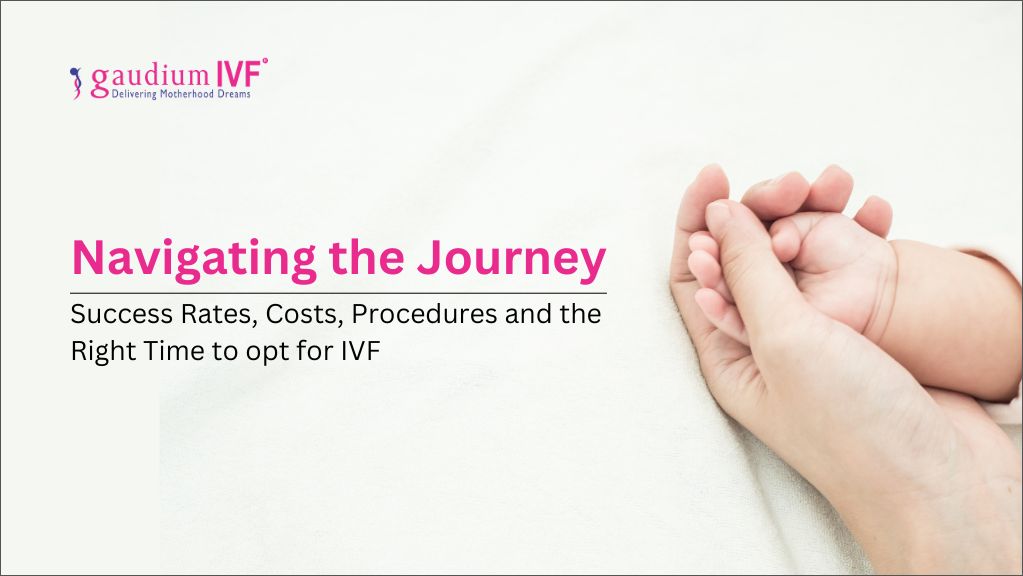In vitro fertilization (IVF) has revolutionized the field of reproductive medicine, offering hope to countless individuals and couples striving to conceive. In this blog with Gaudium IVF, the best IVF Center in Mumbai we will understand success rates, and financial aspects and will delve into the intricate procedures involved.
IVF Success Rates:
IVF success rates vary depending on several factors, including age, underlying fertility issues, and the clinic’s expertise. Generally, younger individuals tend to have higher success rates, as egg quality and quantity decline with age. However, it’s essential to note that success rates can fluctuate between clinics, emphasizing the importance of thorough research and consultation.
In vitro fertilization (IVF) Cost Considerations:
The IVF cost in Mumbai can be a significant concern for many couples. On average, the cost of a single IVF cycle can fluctuate from clinic to clinic ranging from Rs.150,000 to Rs.300,000, it may or may not include additional expenses such as medications, diagnostic tests, and embryo storage fees. Insurance coverage for IVF varies widely, with some plans offering partial or full coverage, while others provide no coverage at all. Many clinics also provide IVF treatment at low-cost EMIs. Understanding insurance benefits and exploring financing options can help reduce the financial burden associated with IVF treatment.
In vitro fertilization (IVF) Procedure Overview:
1. Ovarian Stimulation:
The IVF process typically begins with ovarian stimulation, where fertility medications are administered to stimulate the ovaries to produce multiple eggs.
2. Egg Retrieval:
Once the eggs reach maturity, a minor surgical procedure known as egg retrieval is performed under sedation. A thin needle is inserted into the ovaries to collect the mature eggs.
3. Fertilization:
The collected eggs are then fertilized with sperm in a laboratory setting. Depending on the circumstances, fertilization can occur through conventional insemination or intracytoplasmic sperm injection (ICSI), where a single sperm is injected directly into an egg.
4. Embryo Culture:
The fertilized eggs, now embryos, are cultured in a laboratory for several days to monitor their development and select the healthiest embryos for transfer.
5. Embryo Transfer:
Typically, one or more embryos are transferred into the woman’s uterus using a thin catheter. This process is relatively quick and painless, resembling a Pap smear procedure.
Additional Considerations:
Frozen Embryo Transfer (FET): Unused embryos from the initial IVF cycle can be cryopreserved for future use through frozen embryo transfer, offering patients additional opportunities to conceive without undergoing ovarian stimulation again.
When should you opt for IVF?
IVF becomes a good option when conventional methods have proven ineffective. Here are scenarios where IVF may be a good choice:
1. Severe Male Infertility:
In cases of severe male factor infertility, where sperm quality or quantity is compromised, IVF with intracytoplasmic sperm injection (ICSI) can bypass natural barriers to fertilization, facilitating conception.
2. Tubal Factor Infertility:
IVF is an excellent option for individuals with blocked or damaged fallopian tubes, as it allows for the direct transfer of embryos into the uterus, bypassing the need for functional fallopian tubes.
3. Ovulation Disorders:
Women with irregular ovulation or ovulatory disorders, such as polycystic ovary syndrome (PCOS), may benefit from IVF by carefully controlling ovarian stimulation and monitoring egg development.
4. Endometriosis:
For individuals with endometriosis, a condition where tissue similar to the lining of the uterus grows outside the uterus, IVF offers a path to conception by retrieving eggs and transferring embryos directly into the uterus, bypassing potential obstacles caused by the condition.
5. Unexplained Infertility:
In cases where the cause of infertility remains unexplained despite thorough evaluation, IVF may offer a diagnostic and therapeutic approach, allowing close monitoring of egg development, fertilization, and embryo quality in a controlled laboratory setting.
Conclusion
Navigating the world of IVF involves understanding various aspects, including success rates, costs, and procedural details. While IVF can be emotionally and financially demanding, advances in technology and medical expertise continue to enhance its efficacy and accessibility, offering renewed hope to individuals and couples on their journey to parenthood. Ultimately, the decision to pursue IVF should be made in consultation with the best fertility specialist in Mumbai, taking into account individual medical history, preferences, and emotional readiness for assisted reproductive technologies.
Source: https://www.gaudiumivfcentre.com/blog/in-vitro-fertilization-ivf-success-rates-costs-procedures/






Comments